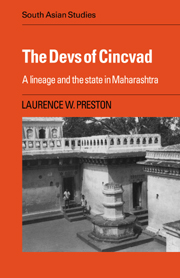Book contents
- Frontmatter
- Contents
- List of figures and tables
- Preface
- List of abbreviations and note on Indian technical usages
- Introduction: an inamdar lineage in Indian history
- PART ONE THE INAMDAR UNDER THE MARATHAS
- PART TWO THE INAMDAR UNDER THE BRITISH
- 3 Introduction to Part Two
- 4 From ritual grandee to state pensioner: varsasans and the Morgav pilgrimage
- 5 An inamdar's domain: Cincvad and the commerce of Pune-Haveli
- 6 The genesis and operation of the Inam Commission
- 7 Claiming an inheritance: the Inam Commission and the Cincvad Samsthan
- 8 Conclusion: an inamdar's rights and the authority of the state
- Bibliography
- Index
- CAMBRIDGE SOUTH ASIAN STUDIES
3 - Introduction to Part Two
from PART TWO - THE INAMDAR UNDER THE BRITISH
Published online by Cambridge University Press: 05 November 2011
- Frontmatter
- Contents
- List of figures and tables
- Preface
- List of abbreviations and note on Indian technical usages
- Introduction: an inamdar lineage in Indian history
- PART ONE THE INAMDAR UNDER THE MARATHAS
- PART TWO THE INAMDAR UNDER THE BRITISH
- 3 Introduction to Part Two
- 4 From ritual grandee to state pensioner: varsasans and the Morgav pilgrimage
- 5 An inamdar's domain: Cincvad and the commerce of Pune-Haveli
- 6 The genesis and operation of the Inam Commission
- 7 Claiming an inheritance: the Inam Commission and the Cincvad Samsthan
- 8 Conclusion: an inamdar's rights and the authority of the state
- Bibliography
- Index
- CAMBRIDGE SOUTH ASIAN STUDIES
Summary
Only slowly did the British become interested in their privileged inamdar subjects. Between the conquest of the Deccan in 1817–18 (Pune was occupied on 7 November 1817 after the Battle of Khadki) and 1860 (marking the aftermath of the Mutiny and the end of the East India Company's government), three phases of state–inamdar relations can be discerned. Until 1826 all the affairs of the Maratha state's feudatories were solely in the hands of the provisional government of the Deccan Commission. Between 1826 and 1852 the Company's district revenue officers shared this duty with the Agent for Sardars, an officer charged with overseeing political and judicial affairs. After 1852 the Inam Commission assumed formal responsibility for most matters that affected inamdars and other holders of alienated revenue. The four chapters in this section examine postconquest state–inamdar relations through these three periods by concentrating on the actual administration of British alienated revenue policy and its effect on the Devs of Cincvad.
The policy of the Deccan Commission in all its dealings in the ‘new conquests’ was political conciliation. Mountstuart Elphinstone, the first Commissioner in the Deccan, his successor William Chaplin, and the subordinate district officers knew the old order at first hand as political residents or army officers. They had no illusions about their often generous treatment of the privileged subjects of the Maratha state.
- Type
- Chapter
- Information
- The Devs of CincvadA Lineage and the State in Maharashtra, pp. 87 - 91Publisher: Cambridge University PressPrint publication year: 1989

